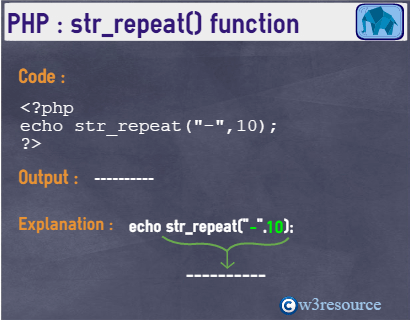PHP: str_repeat() function
PHP: Repeat a string
The str_repeat() function is used to repeat a string, a specified number of times.
Version:
(PHP 4 and above)
Syntax:
str_repeat(string_name, repeat_no)
Parameters:
| Name | Description | Required / Optional |
Type |
|---|---|---|---|
| string_name | The string to be repeated. | Required | String |
| repeat_no | Number of times the input string should be repeated. | Required | Integer |
Return value:
The repeated string
Value Type: String
Pictorial Presentation

Example:
<?php
echo str_repeat("-",20);
echo('<br>');
echo str_repeat("==",20);
echo('<br>');
echo str_repeat("=*=",15);
?>
Output :
-------------------- ======================================== =*==*==*==*==*==*==*==*==*==*==*==*==*==*==*=
View the example function in the browser
See also
Previous: sscanf
Next: str_shuffle
